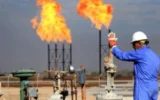
More than 2,000 items of goods exchanged between Iran and Russia; trade volume reached $4.7 billion
The Russian secretary of the Iran-Russia Joint Economic Commission announced the possibility of exchanging more than 2,000 items of goods and services between the two countries, saying: "According to the latest statistics, the volume of trade between the two countries has reached 4.7 billion dollars."

100,000 barrels increase in oil production in the oil-rich areas of the south; a big step towards the Seventh Plan
Within this framework, the southern oil-rich regions, by simultaneously focusing on maintaining production, developing fields, improving operational readiness, and increasing the resilience of facilities, were able to increase the average daily crude oil production by about 100,000 barrels in the operational scope of the Karun, Marun, Aghajari, Masjed Soliman, and Gachsaran oil and gas exploitation companies, while compensating for the natural decline in reservoirs; an increase that was the result of a series of field, technical, and managerial measures and highlights the decisive role of this company in the sustainable supply of energy to the country.

The 19th Joint Commission on Economic Cooperation between Iran and Russia is an important opportunity to deepen strategic relations between Tehran and Moscow
The Minister of Oil considered the 19th meeting of the Iran-Russia Joint Commission an important opportunity to deepen strategic relations between Tehran and Moscow and emphasized: Strengthening economic cooperation between Iran and Russia can play an effective role in enhancing the economic capabilities of the two countries and forming an order based on common interests.
آخرین اخبار

The National Iranian Oil Company’s announcement on the British court ruling; Legal follow -up continues

Growth of 6,000 barrels of oil production; Exports reached the highest record of sanctions

Majid Ansari: Crescent is not over! Its second and third dimensions are in the flow

Pazan Square became Iran’s largest onshore gas field

Improved country fuel reserves; The interaction of the Ministry of Petroleum with the Positive Energy Base was evaluated

The implementation of the Natural Gas Carrier Project begins in 2 to 5 provinces

From Maroon Petrochemical’s Failed Experience Downstream to the Mist of Oblivion on the Propylene Chain

Bu Ali Sina Petrochemical Plant to undergo overhaul

Discovery of a gas field with reserves of 10 trillion cubic feet of gas





